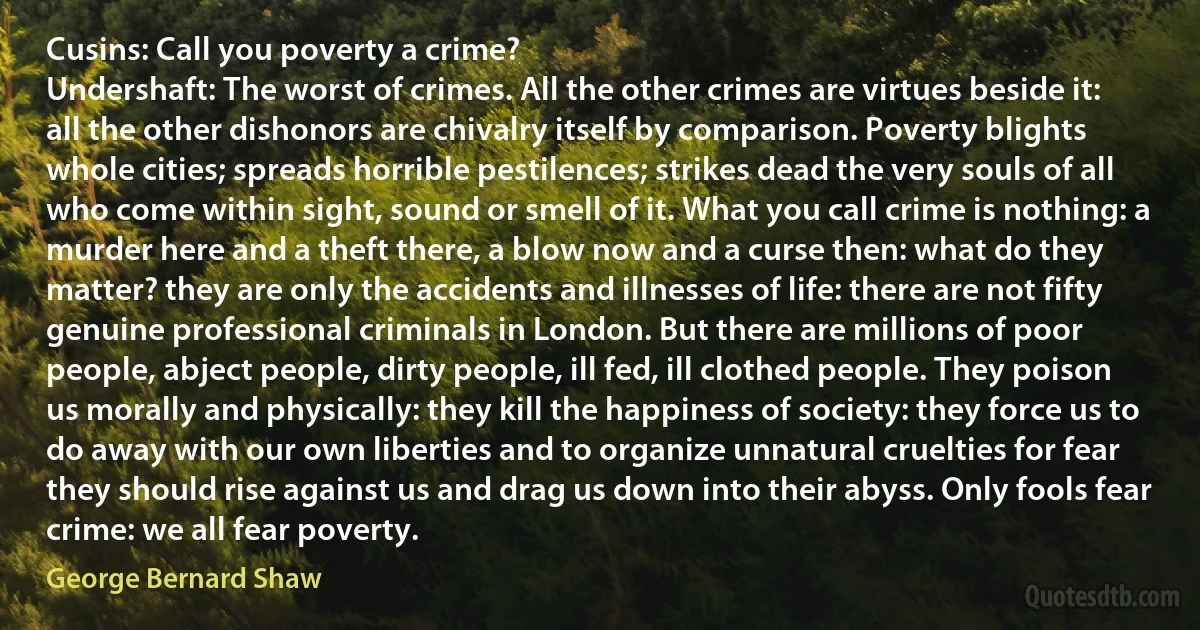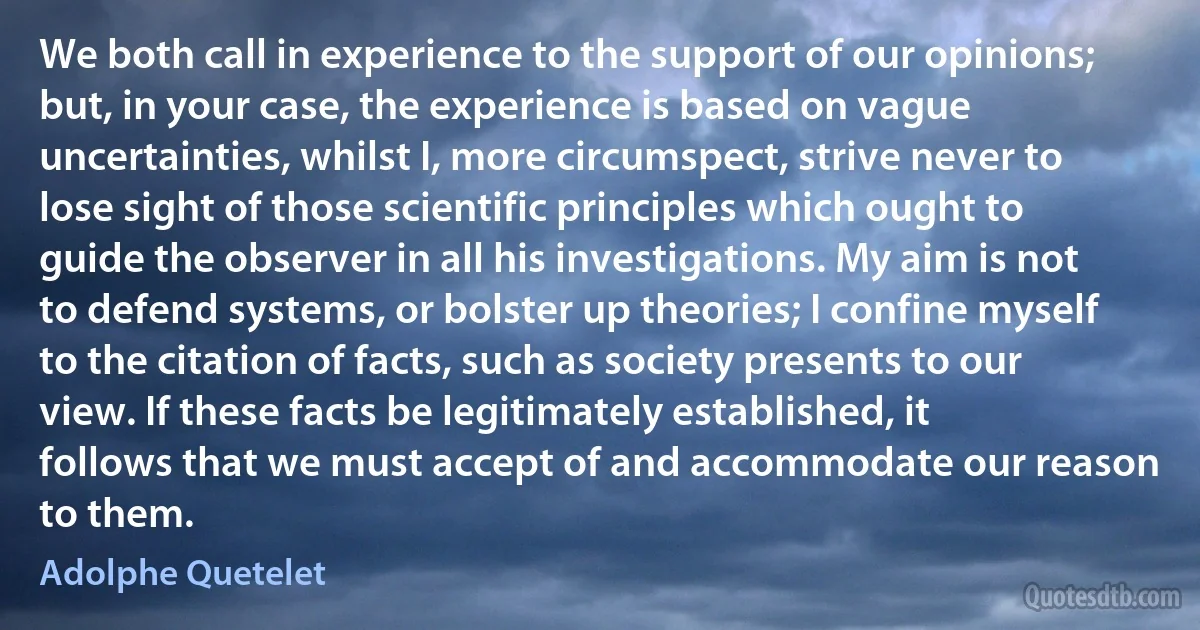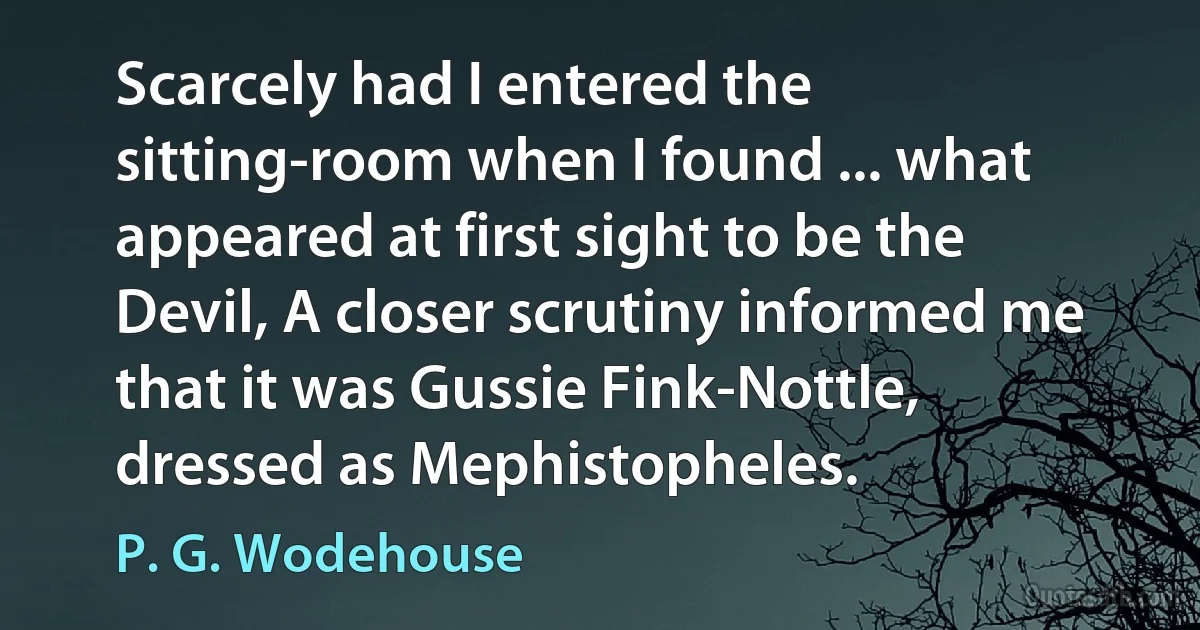Sight Quotes - page 16
You that would last long, list to my song,
Make no more coil, but buy of this oil.
Would you be ever fair and young?
Stout of teeth and strong of tongue?
Tart of palate, quick of ear?
Sharp of sight, of nostril clear?
Moist of hand and light of foot?
(Or, I will come nearer to it)
Would you live free from all diseases,
Do the act your mistress pleases;
Yet fright all aches from your bones?
Here's a medicine for the nones.

Ben Jonson
If we sit and talk in a dark room, words suddenly acquire new meanings and different textures...and on the radio. Given only the sound of a play, we have to fill in all of the senses, not just the sight of the action. So much do-it-yourself, or completion and "closure” of action, develops a kind of independent isolation in the young that makes them remote and inaccessible.”.

Marshall McLuhan
Ye fetted pinnacles, ye fanes sublime,
Ye towers that wear the mossy vest of time;
Ye massy piles of old munificence,
At once the pride of learning and defence;
Ye cloisters pale, that, lengthening to the sight,
To contemplation, step by step, invite;
Ye temples dim, where pious duty pays
Her holy hymns of everlasting praise -
Hail! Oxford, hail!

Thomas Warton
On land you saw how the pride of Captain Pedel was so much humbled that he with his men, who are as foolish as himself, could not even bear the look of my men; and how, on the mere sight of my warriors, they threw down their arms and willingly awaited their well-deserved punishment with outstretched necks. Are these not sufficient proofs of your incompetency and inability to resist my forces?

Koxinga
A person examining too nearly a small portion of a very large circle... would see in this detached portion merely a certain quantity of physical points, grouped in a more or less irregular manner, and so, indeed, as to seem as if they had been arranged by chance... But, placing himself at a greater distance, the eye embraces of necessity a greater number of points, and already a degree of regularity is observable... and by removing still farther from the object, the observer loses sight of the individual points, no longer observes any accidental or odd arrangements amongst them, but discovers at once the law presiding over their general arrangements, and the precise nature of the circle so traced.

Adolphe Quetelet
We aim at a target-an end-marked by a point. The arrows go to right and left, high or low, according to the address of the shooters. In the mean time, after a considerable number of trials, the butt, which has not yet been touched, perhaps, a single time, becomes so well pointed out by the marks around it, that they would aid at once in rediscovering it, if it should chance to be lost sight of. Nay, more than this; even aims the most unfortunate may be made to conduce to this end; commencing with those marks which are farthest away, if they be sufficiently numerous, one may learn from them the real position of the point they surround.

Adolphe Quetelet
But I have seen the unknown dead, those little men of the Republic. It was they who woke me up. If a stranger, an enemy, becomes a thing like that when he dies, if one stops short and is afraid to walk over him, it means that even beaten our enemy is someone, that after having shed his blood, one must placate it, give this blood a voice, justify the man who shed it. Looking at certain dead is humiliating. One has the impression that the same fate that threw these bodies to the ground holds us nailed to the spot to see them, to fill our eyes with the sight. It's not fear, not our usual cowardice. One feels humiliated because one understands–touching it with one's eyes–that we might be in their place ourselves: there would be no difference, and if we live we owe it to this dirtied corpse. That is why every war is a civil war; every fallen man resembles one who remains and calls him to account.

Cesare Pavese
As music is the poetry of sound, so is painting the poetry of sight, and the subject-matter has nothing to do with harmony of sound or of colour. The great musicians knew this. w:Beethoven and the rest wrote music - simply music; symphony in this key, concerto or sonata in that... Art should be independent of all claptrap - should stand alone, and appeal to the artistic sense of eye or ear, without confounding this with emotions entirely foreign to it, as devotion, pity, love, patriotism, and the like. All these have no kind of concern with it; and that is why I insist on calling my works 'arrangements' and 'harmonies.

James McNeill Whistler
Today, many of us picked up our newspapers, and we were horrified to see the sight of 10 American sailors on their knees, with their hands on their heads. In that State of the Union, President Obama didn't so much as mention the 10 sailors that had been captured by Iran. President Obama's preparing to send $100 billion or more to the Ayatollah Khamenei. And I'll tell you, it was heartbreaking. But the good news is the next commander-in-chief is standing on this stage. And I give you my word, if I am elected president, no service man or service woman will be forced to be on their knees, and any nation that captures our fighting men will feel the full force and fury of the United States of America.

Ted Cruz
We know, deep down, that repression is not the wave of the future. We know that the desire for freedom is not confined to, or owned by, any culture; it is the inborn hope of our humanity. We know that free governments are the only way to ensure that the strong are just and the weak are valued. And we know that when we lose sight of our ideals, it is not democracy that has failed. It is the failure of those charged with preserving and protecting democracy.

George W. Bush
Don't blame me, Pongo,' said Lord Ickenham, 'if Lady Constance takes her lorgnette to you. God bless my soul, though, you can't compare the lorgnettes of to-day with the ones I used to know as a boy. I remember walking one day in Grosvenor Square with my aunt Brenda and her pug dog Jabberwocky, and a policeman came up and said the latter ought to be wearing a muzzle. My aunt made no verbal reply. She merely whipped her lorgnette from its holster and looked at the man, who gave one choking gasp and fell back against the railings, without a mark on him but with an awful look of horror in his staring eyes, as if he had seen some dreadful sight. A doctor was sent for, and they managed to bring him round, but he was never the same again. He had to leave the Force, and eventually drifted into the grocery business. And that is how Sir Thomas Lipton got his start.

P. G. Wodehouse
I get the willies when I see closed doors. Even at work, where I am doing so well now, the sight of a closed door is sometimes enough to make me dread that something horrible is happening behind it, something that is going to affect me adversely; if I am tired and dejected from a night of lies or booze or sex or just nerves and insomnia, I can almost smell the disaster mounting invisibly and flooding out toward me through the frosted glass panes. My hands may perspire, and my voice may come out strange. I wonder why. Something must have happened to me sometime.

Joseph Heller



